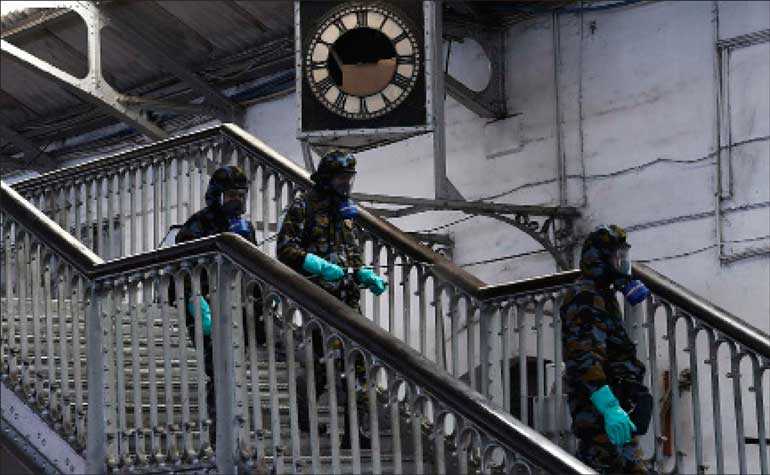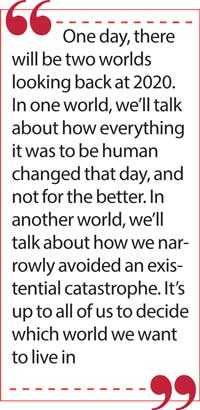Thursday Feb 26, 2026
Thursday Feb 26, 2026
Friday, 3 April 2020 00:00 - - {{hitsCtrl.values.hits}}

By VLM
After WW2, the high-risk nuclear game played by the USA and the USSR was the single most scary thing to have happened in living memory. Of course, this risk never ended up realising itself. Today, we are in a situation that has a much higher chance of changing the world as we know it, simply because it already has.
COVID-19 has harmed the world to and beyond the scale of the World Wars of the early 1900s, and unless we manage the upcoming few months carefully, the world after the coronavirus will be unimaginably different to the one we’re all used to.
By the time this article is published, around a million people across the world would have contracted the disease. Tens of thousands would have died. Despite all this carnage, it’s now clear that the virus is nowhere near its peak. While we’re still beginning to come to terms with the health consequences of COVID-19, the economic costs are now beginning to look equally dangerous. 
Unfortunately, these costs are in opposition to each other. The very same measures that we use to save lives WILL tank economies across the globe. So how do we balance this and ensure we don’t end up broken on both fronts?
The health first approach: Shut the virus out now!
Fortunately from a health and moral standpoint, almost all countries in the world are taking this approach, shutting down countries, putting up lockdowns and curfew, and trying their best to keep people away from each other, and hence away from the virus. From that same health point of view, this helps the future management of the disease, since now governments can spend fewer resources on containment and treatment, simply because there are fewer people sick.
This approach helps avoid the risk of surgical tracing measures. While a society like Singapore seemed to be able to conduct this well enough, most countries are clearly not disciplined enough to allow for this. For countries like these, this kind of heavy approach is the only possible medical solution. Even Singapore is seeing its system failing, going into a lockdown of sorts more recently.
The biggest and most glaring problem with this approach is the massive economic cost. When such large parts of the economy, often nearly 100%, is simply shut down, it’s clear that there will be a huge economic hit, possibly larger than seen in a hundred years. As companies and enterprises, small and large, all over the world stop working, it will also result in large salary cuts, unprecedented layoffs, and even record levels of bankruptcy.
The poorer and more disadvantaged in our communities will be the worst impacted, as they simply depend on day to day work for basic survival, and unlike the richer industrialists, won’t have a few million sitting in cash.
The economy first approach: Save businesses before anything!
As people around the globe become more and more affected by the lockdowns, this is becoming an increasingly heard opinion. The idea is to open the economy and enforce lockdowns in places necessary and conduct strong contact tracing. Of course, the reason given is that the economy will collapse otherwise and that people will suffer worse outcomes as a result of that, and the poor are often taken into account in these arguments. Let’s put aside the fact that big business owners have suspiciously caring of the poor all of a sudden, and look at the argument itself.
We already explained why these lockdowns don’t work from the point of view of epidemiological management, but there are three additional reasons why this is a terrible approach.
First and most importantly, people will die. Even with strong lockdowns, we’ve still seen countries like Italy have more than 10,000 people die of the virus. If we let loose, this will undoubtedly increase, and yes, it will be exponential. There have been numerous experts talking about how death tolls will reach the millions and even dozens and hundreds of millions if we let go, and this alone should be enough to discredit this approach.
But secondly, for the more economically minded, this means huge economic costs as well. The moment a situation like the above starts to happen, governments across the world will once more go into lockdown. Only this time, because there are more people sick, it will be needed for a lot longer. It doesn’t stop there, because enforcing this will be much harder (and hence more expensive) when your police forces and your military are also sick, in addition to your health care workers.
Finally, most proponents of opening up economies seem to disregard the long-term consequences to the economy. Maybe the world’s businesses will be able to run well in April if this happens. But the rest of the year and beyond will be much worse. Imagine what happens when many millions more lose their jobs because of a longer lockdown? Imagine what happens when thousands of businesses collapse because they have no revenue for EVEN longer? Imagine what happens when millions die?
Not only will our economy enter a more severe recession than ever before, but human society will be so very changed. In this situation, the kind of fiscal help needed by governments will be orders of magnitude more, and either that puts countries heavily under debt or it simply doesn’t happen to the extent that is needed. Any recovery will take much, much longer.
The choice, therefore, is not between lives and the economy. It’s between lives along with a recession versus death along with a depression. In those terms, we think the choice is pretty clear.
What do we do: Mitigate the short term damage to the economy
While opening up countries is disastrous, that doesn’t mean we can ignore the very real economic harms of lockdowns either. There need to be targeted steps taken to help people and businesses survive right now.
What does this look like? From a business front, this looks like access to easy capital to keep businesses afloat. From an employment front, this looks like rebates and allowances on tax and payroll payments. From a social front, this looks like direct cash handouts and surgical delivery of essentials to those who can’t afford it. Since all this is difficult, governments need to take drastic measures like negotiating moratoriums on international debt and even considering fringe ideas like Modern Monetary Theory.
Will all of this happen? Probably! Sri Lanka has done an especially good job of providing these requirements given the circumstances, but of course, has a long way to go. But what most seem to miss is that this is only a temporary need. Human ingenuity will pull through. This might be in terms of widely accessible and cheap tests that allow surgical lockdowns at low costs. This might be in terms of treatments that make the disease easier and safer to cure. For countries like Sri Lanka, this might even be in terms of the virus itself being weaker here than in the rest of the world.
However, we still don’t know what will happen. We still don’t know what kind of change will happen to turn the tide against the disease. But we can be relatively sure of is that there will be SOMETHING. This is not just pure hope. There is enough evidence to show people across the globe working on these kinds of end goals. Probability dictates that there is a relatively high chance of at least ONE of these working out. Until these happen, however, we need to hunker down and plod on. It won’t be easy. It won’t be cheap. It won’t be perfect. But plod on we must, because the alternative is far too ghastly to consider.
One day, there will be two worlds looking back at 2020. In one world, we’ll talk about how everything it was to be human changed that day, and not for the better. In another world, we’ll talk about how we narrowly avoided an existential catastrophe. It’s up to all of us to decide which world we want to live in.
(The authors are happy to have the opinions in this article used and shared even without attribution by any reader due to the huge impacts of the coronavirus. They can be contacted on [email protected] for any questions and data)